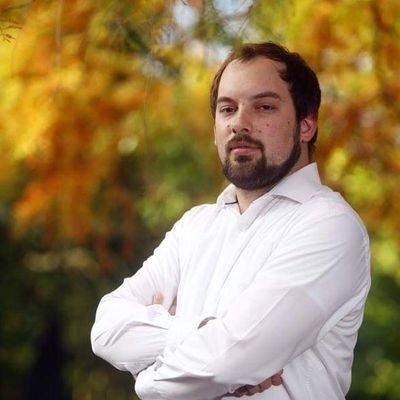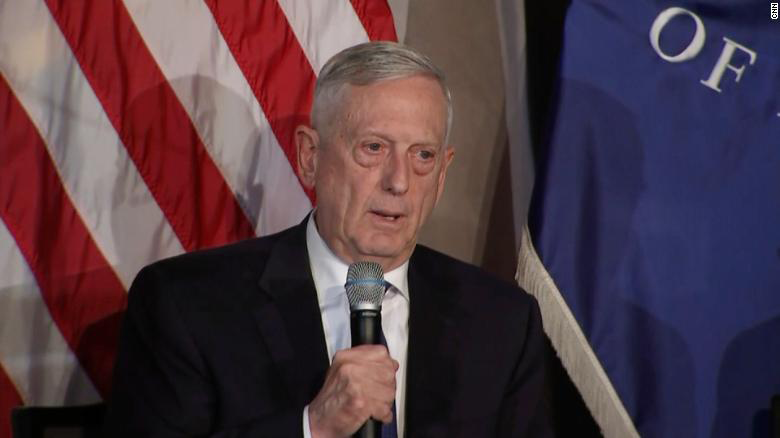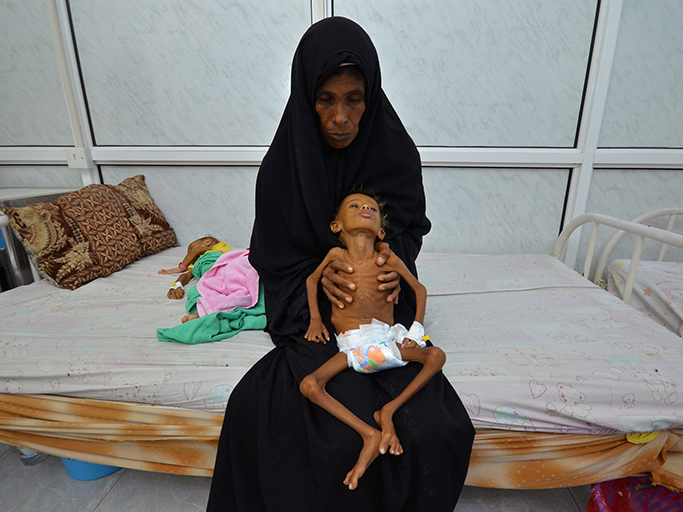



 Brecht Jonkers
Brecht Jonkers When US Secretary of Defense Jim Mattis called on October 30 for “ceasefire” in Yemen, did he really mean it? He said he wanted to bring about an end to hostilities and hoped that all parties could be brought to the negotiation table by the end of November (after CI press time).
In typical diplomatic lingua and vague “hopes for peace,” Mad Dog Mattis did what imperialist politicians in the West do all too often. They use the smokescreen of nice verbiage to hide the ugly truth of their own involvement in the wars they allegedly condemn.
The same false concern was evident regarding Afghanistan in 2001; or toward Iraq, when the “coalition of the willing” invaded and destroyed the country in 2003. This also applied more recently to Libya (2011) and the so-called “Asad regime” change plan for Syria (2011–present). While being directly involved in destabilizing, destroying and attacking Muslim countries in the region, the United States keeps up a façade of being a “partner for peace.”
Mattis’ call for ceasefire in Yemen is no different. Several sources have already shown that Saudi-led attacks have not only intensified but increased in frequency since Mattis’ statement. Whether this is borne of Saudi fears that the US may actually stop supporting their war, or a clear signal that they don’t desire peace at all, is a moot point.

What is important is that the US refuses to use its power and influence to stop the Saudi and Emirati regimes from massacring Yemeni civilians.
At a campaign rally in October, US President Donald Trump had said that the Saudi regime would not last two weeks without US support. This may be an undiplomatic statement but is nonetheless true. The Saudi regime, humiliated by its inability to subdue the poorest country in West Asia, relies on foreign funding, weapons systems, and direct intelligence to prosecute the war. Without such support, the monarchy would certainly crumble.
So why is there no serious effort by the US to force the Saudis to cease their attacks on Yemen that constitute war crimes? Why is there no end to military support, or withdrawal of US military intelligence officers from the war rooms of the invasion forces? Why does the $110 billion US arms deal with Saudi Arabia stay in place? There are reports that it will mushroom to $350 billion in 10 years.
Truth is that the US and Saudi Arabia need each another: the former to safeguard its supremacy in the region while the latter for survival. The Riyadh regime can only survive with US help and backing. It has no internal capacity to protect itself. The other reason is that the Washington warlords need a constant source of cheap petroleum in order to maintain their military and economic hegemony in the world.
‘Abd al-Malik al-Huthi, leader of the Yemeni Revolution, stated recently, “The United States has managed to reap tremendous financial gains, including arms deals, from the Saudi-led aggression on Yemen. Washington is supporting the Riyadh regime’s ability to stand on its feet.”
So what is really behind the call from Mattis for peace, aside from trying to look good in the eyes of uninformed observers? By calling for peace, while at the same time making peace impossible, the US tries to make it look as if it is the National Salvation Government (NSG) of Yemen (often referred to by the insulting term “the Houthis” in the mainstream media) that is refusing to make peace.

This has happened before. In September 2018, UN-mediated peace talks failed when delegates of the Yemeni revolutionary government did not attend the conference in Geneva. Pro-Saudi mouthpieces immediately cited this as an example of NSG’s unwillingness to make peace. The so-called “foreign minister” of the Saudi-backed Hadi regime, Khalid al-Yamani, accused the NSG of being “totally irresponsible” and of “trying to sabotage the negotiations,” while the UAE Minister of State Anwar Gargash tweeted. “What is perhaps clearer now to the international community is the unwillingness of the Houthis to engage in good faith with such a process.”
It soon became clear that the National Salvation Government delegation was deliberately prevented from leaving Yemen by the aggressors and their Yemeni allies. The NSG delegation had chartered an officially licensed Omani commercial aircraft to travel but it was prevented from doing so.
The United Nations Special Envoy Martin Griffiths confirmed this when he said, “They [the National Salvation Government] would have liked to get here, [but] we didn’t make conditions sufficiently correct to get them here.” Just days after the Geneva talks failed, Griffiths met with the Yemeni delegation in the Omani capital of Muscat, and even met with Yemeni president Mahdi al-Mashat. This was a clear sign on the part of the Yemeni revolutionary government to cooperate. Nevertheless, its reputation was damaged through false propaganda.
The willingness of the NSG to negotiate did not stop there. Ever since Mattis’ announcement, the Yemeni revolutionary government has on numerous occasions called for peace negotiations in good faith. Muhammad ‘Ali al-Huthi, head of the Supreme Revolutionary Committee and one of the most influential political figures in Yemen, has offered an olive branch several times in the past few months.
In early November, Muhammad al-Huthi called for a binding resolution to end the conflict, stating, “Calls for cessation of the war in Yemen are not enough… because the Saudi-led aggression and its allies in Yemen, don’t consider these calls as binding.”
Only days later, the Saudi invasion force unleashed a massive aerial bombardment and ground attack on the pivotal port city of Hudaydah, killing hundreds of civilians. However, the Saudis were beaten back and humiliated after suffering heavy casualties at the hands of the Yemeni defenders.
Again, Muhammad al-Huthi took to the stage to condemn the attack as an impediment to peace, noting, “It is a usual habit to have a military escalation after any US declaration… about the humanitarian side.”
On November 9, something unusual happened. The Washington Post published an op-ed piece written by Muhammad al-Huthi himself, “Yemen was not the one who declared the war in the first place… we were close to a power-sharing deal in 2015, that was disrupted by the coalition airstrikes. We are ready to stop the missiles if the Saudi-led coalition stops its airstrikes.”
A little later into his opinion piece, he wrote, “We love peace — the kind of honorable peace defended by our revolution’s leader, ‘Abd al-Malik al-Huthi. We are ready for peace, the peace of the brave. God willing, Yemenis will remain the callers of peace and lovers of peace.”
And on November 14, Muhammad al-Huthi openly declared he was in contact with the British foreign secretary and the UN envoy in order to find a peace agreement, stating “now is the time that the whole world must know who is calling for peace, and who is refusing it.”
Yemen has always been ready for peace. Those whom the West calls “Houthis” have always been ready for peace. They are not an obstruction on the road to peace. The obstructionists are the Saudi-led invasion force and its supporter: the United States of America.
Sayyid ‘Abd al-Malik al-Huthi voiced it this way in early November, “The US role in the military operations against our nation is pivotal. All fiendish plots against Yemen are hatched by the US, Saudi Arabia and the United Arab Emirates… Washington is speaking of peace at the same time that it is directing the Yemen war.”
This basically sums up the current situation in Yemen.
